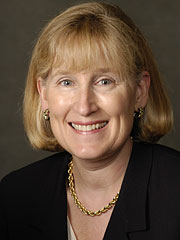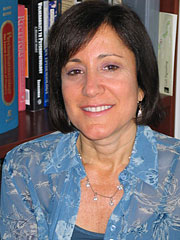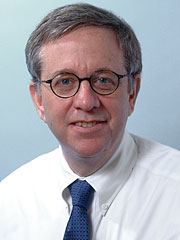PHILADELPHIA - Four professors from the Perelman School of Medicine have been elected members of the Institute of Medicine (IOM), one of the nation's highest honors in biomedicine. Three of the four new inductees are women.
The new members bring Penn's total to 76, out of a total active membership of 1,649.
Overall, the IOM named 65 new members this year and foreign associates.
"We are proud that four of our most distinguished and accomplished scientists have been named to one of the country's leading institutions," said Dr. Arthur H. Rubenstein, Executive Vice President of the University of Pennsylvania for the Health System and Dean of the School of Medicine. "Having Penn Medicine colleagues elected to this esteemed body is an extraordinarily significant honor."
The IOM was established in 1970 by the National Academy of Sciences to honor professional achievement in the health sciences and to serve as a national resource for independent analysis and recommendations on issues related to medicine, biomedical sciences, and health.
The new Penn IOM members are:
 Deborah A. Driscoll, MD is the Luigi Mastroianni, Jr. Professor and Chair of the Department of Obstetrics and Gynecology. She also serves as the Interim Director of the Center for Research on Reproduction and Women’s Health. A graduate of Smith College and New York University School of Medicine, she completed a residency in Obstetrics and Gynecology at the Hospital of the University of Pennsylvania and a fellowship in Clinical and Molecular Genetics at Penn. Dr. Driscoll is internationally recognized for her research on DiGeorge/velocardiofacial syndrome and the 22q11.2 deletion syndrome. Dr. Driscoll also served as a Project leader on a grant from the National Heart, Lung and Blood Institute to study congenital heart defects and is the principle investigator of Penn’s Women’s Reproductive Health Research career development program. Dr. Driscoll is considered one of the world’s leading obstetrician-gynecologist geneticists who has also been recognized for her expertise in adolescent gynecology and the care of women with genetic disorders. She has been the recipient of several teaching awards including a Lindback Award for Distinguished Teaching. Dr. Driscoll is the Chair of the Medical Board at the Hospital of the University of Pennsylvania and is an active member of the American College of Obstetricians and Gynecologists where she served as Chair of the Committee on Genetics and chair of the Task Force on Genetic Screening. She is a member of the Board of Directors of the American Board of Obstetrics and Gynecology and the Council of University Chairs in Obstetrics and Gynecology.
Deborah A. Driscoll, MD is the Luigi Mastroianni, Jr. Professor and Chair of the Department of Obstetrics and Gynecology. She also serves as the Interim Director of the Center for Research on Reproduction and Women’s Health. A graduate of Smith College and New York University School of Medicine, she completed a residency in Obstetrics and Gynecology at the Hospital of the University of Pennsylvania and a fellowship in Clinical and Molecular Genetics at Penn. Dr. Driscoll is internationally recognized for her research on DiGeorge/velocardiofacial syndrome and the 22q11.2 deletion syndrome. Dr. Driscoll also served as a Project leader on a grant from the National Heart, Lung and Blood Institute to study congenital heart defects and is the principle investigator of Penn’s Women’s Reproductive Health Research career development program. Dr. Driscoll is considered one of the world’s leading obstetrician-gynecologist geneticists who has also been recognized for her expertise in adolescent gynecology and the care of women with genetic disorders. She has been the recipient of several teaching awards including a Lindback Award for Distinguished Teaching. Dr. Driscoll is the Chair of the Medical Board at the Hospital of the University of Pennsylvania and is an active member of the American College of Obstetricians and Gynecologists where she served as Chair of the Committee on Genetics and chair of the Task Force on Genetic Screening. She is a member of the Board of Directors of the American Board of Obstetrics and Gynecology and the Council of University Chairs in Obstetrics and Gynecology.
 Caryn Lerman, PhD, is the Mary W. Calkins Professor in the Department of Psychiatry and the Annenberg Public Policy Center at the University of Pennsylvania. As Director of the Tobacco Use Research Center, her research focuses on the genetic and neural basis of nicotine addiction, with a focus on smoking cessation and therapeutic response. In mid-October she will also become the interim director of the Abramson Cancer Center. Dr. Lerman has been the recipient of the American Psychological Association Award for Outstanding Contributions to Health Psychology; the American Society for Preventive Oncology Joseph Cullen Award for Tobacco Research; the Alton Ochsner Award for Research Relating to Smoking and Health; and the American Cancer Society Cancer Control Award. She served on the National Cancer Institute Board of Scientific Advisors and the NHGRI National Advisory Council for Human Genome Research. She is also a current member of the National Institute on Drug Abuse Advisory Council. Dr. Lerman is the President of the Society for Research on Nicotine and Tobacco. Dr. Lerman received her PhD and MS from the University of Southern California.
Caryn Lerman, PhD, is the Mary W. Calkins Professor in the Department of Psychiatry and the Annenberg Public Policy Center at the University of Pennsylvania. As Director of the Tobacco Use Research Center, her research focuses on the genetic and neural basis of nicotine addiction, with a focus on smoking cessation and therapeutic response. In mid-October she will also become the interim director of the Abramson Cancer Center. Dr. Lerman has been the recipient of the American Psychological Association Award for Outstanding Contributions to Health Psychology; the American Society for Preventive Oncology Joseph Cullen Award for Tobacco Research; the Alton Ochsner Award for Research Relating to Smoking and Health; and the American Cancer Society Cancer Control Award. She served on the National Cancer Institute Board of Scientific Advisors and the NHGRI National Advisory Council for Human Genome Research. She is also a current member of the National Institute on Drug Abuse Advisory Council. Dr. Lerman is the President of the Society for Research on Nicotine and Tobacco. Dr. Lerman received her PhD and MS from the University of Southern California.
 John R. Stanley, MD, the Milton B. Hartzell Professor, is Chair of the Department of Dermatology. Dr. Stanley’s clinical specialties are autoimmune blistering skin diseases, and his chief areas of research include immunodermatology; cell and molecular biology of keratinocyte adhesion; and impetigo. He has received an NIH grant to study the pathogenesis of pemphigus, an autoimmune disease in which auto-antibodies cause loss of keratinocyte cell adhesion and blister formation.
John R. Stanley, MD, the Milton B. Hartzell Professor, is Chair of the Department of Dermatology. Dr. Stanley’s clinical specialties are autoimmune blistering skin diseases, and his chief areas of research include immunodermatology; cell and molecular biology of keratinocyte adhesion; and impetigo. He has received an NIH grant to study the pathogenesis of pemphigus, an autoimmune disease in which auto-antibodies cause loss of keratinocyte cell adhesion and blister formation.
A former senior investigator in the Dermatology Branch of the National Cancer Institute, Dr. Stanley came to Penn in 1995. He has been elected to the American Society for Clinical Investigation, the American Dermatological Association, and the Association of American Physicians. Dr. Stanley is associate editor of The Journal of Investigative Dermatology and The Journal of Clinical Investigation. He earned his medical degree from Harvard Medical School and took his internship at the University of Washington Affiliated Hospitals and his residency in dermatology at the New York University Medical Center.
 Margaret Stineman, MD, is Professor of Physical Medicine and Rehabilitation and Professor of Epidemiology in the Center for Clinical Epidemiology and Biostatistics. Dr. Stineman’s expertise is in statistical modeling, measurement, and development of patient classification systems. She and her colleagues developed a patient classification approach that forms the basis for Medicare’s national payment system for inpatient rehabilitation; established staging systems for addressing patients’ mobility and abilities to care for themselves; established measures for addressing the effects of medical conditions on quality of life; and addressed the effect of environmental barriers on the expression of disability. Currently, she and her colleagues are developing therapeutic tools for enhancing patient understanding of and involvement in the recovery process, and studying the effects of comprehensive rehabilitation services on patient outcomes following lower extremity amputation. She received her MD from Hahnemann University.
Margaret Stineman, MD, is Professor of Physical Medicine and Rehabilitation and Professor of Epidemiology in the Center for Clinical Epidemiology and Biostatistics. Dr. Stineman’s expertise is in statistical modeling, measurement, and development of patient classification systems. She and her colleagues developed a patient classification approach that forms the basis for Medicare’s national payment system for inpatient rehabilitation; established staging systems for addressing patients’ mobility and abilities to care for themselves; established measures for addressing the effects of medical conditions on quality of life; and addressed the effect of environmental barriers on the expression of disability. Currently, she and her colleagues are developing therapeutic tools for enhancing patient understanding of and involvement in the recovery process, and studying the effects of comprehensive rehabilitation services on patient outcomes following lower extremity amputation. She received her MD from Hahnemann University.
Penn Medicine is one of the world’s leading academic medical centers, dedicated to the related missions of medical education, biomedical research, excellence in patient care, and community service. The organization consists of the University of Pennsylvania Health System and Penn’s Raymond and Ruth Perelman School of Medicine, founded in 1765 as the nation’s first medical school.
The Perelman School of Medicine is consistently among the nation's top recipients of funding from the National Institutes of Health, with $550 million awarded in the 2022 fiscal year. Home to a proud history of “firsts” in medicine, Penn Medicine teams have pioneered discoveries and innovations that have shaped modern medicine, including recent breakthroughs such as CAR T cell therapy for cancer and the mRNA technology used in COVID-19 vaccines.
The University of Pennsylvania Health System’s patient care facilities stretch from the Susquehanna River in Pennsylvania to the New Jersey shore. These include the Hospital of the University of Pennsylvania, Penn Presbyterian Medical Center, Chester County Hospital, Lancaster General Health, Penn Medicine Princeton Health, and Pennsylvania Hospital—the nation’s first hospital, founded in 1751. Additional facilities and enterprises include Good Shepherd Penn Partners, Penn Medicine at Home, Lancaster Behavioral Health Hospital, and Princeton House Behavioral Health, among others.
Penn Medicine is an $11.1 billion enterprise powered by more than 49,000 talented faculty and staff.